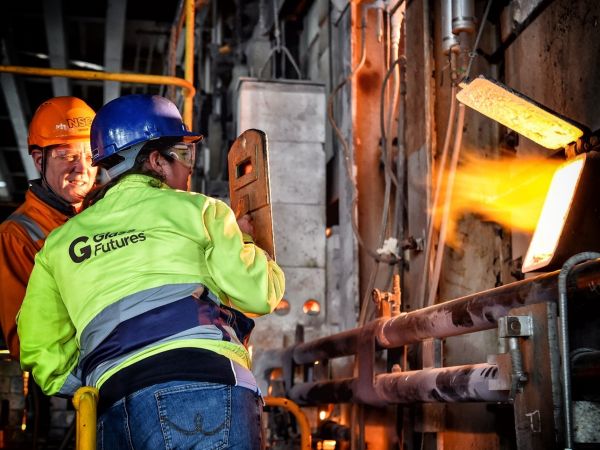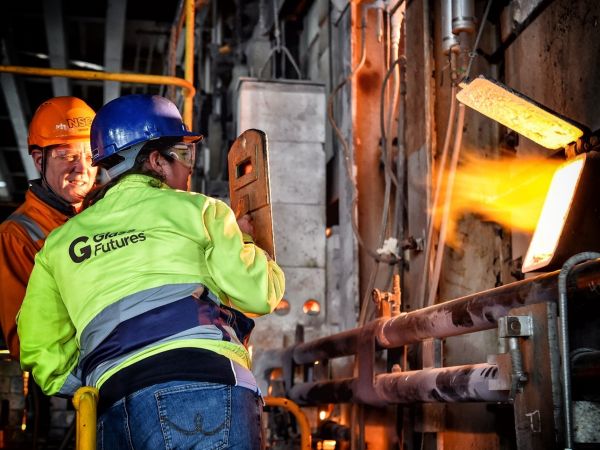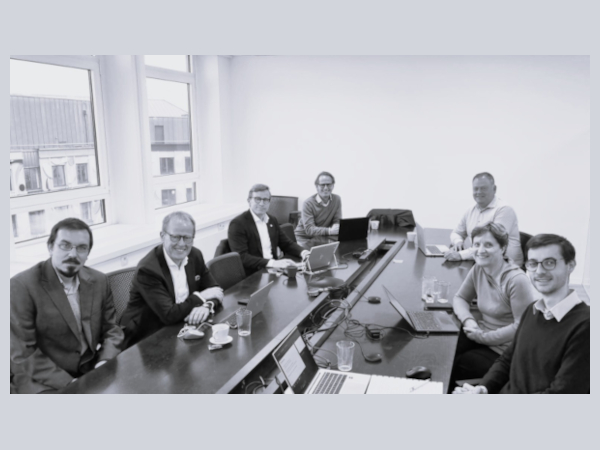
Date: 17 October 2024
A major industrial trial was successfully undertaken this month as part of a Glass Futures project to identify and demonstrate a variety of economically and technically suitable low-cost bioderived fuels for a range of industrial glass and ceramics sites with furnaces of varying designs and scales.
In previous Industrial Fuel Switching (IFS) round 1, phase 3 projects, Glass Futures demonstrated the feasibility of a number of biofuels such as for use in glass furnaces and identified fuels that emit circa 80% less Scope 1 CO2 than traditional natural gas. However, these fuels were found to be typically 2-3 times more expensive than natural gas and therefore, economically unattractive.
The first of five trials* kicked off with a successful industrial-scale trial at Pilkington UK Limited’s (part of NSG Group) Greengate site in St Helens as part of a project funded by the UK government under the Department for Energy Security and Net Zero’s (DESNZ) IFS 2, phase 2 programme, funded within its Net Zero Innovation Portfolio.
Not only will the project develop a detailed understanding of these fuels, their availability and potential CO2 savings but will also assess their compatibility with Carbon Capture Utilisation & Storage (CCUS) technologies in a project led by C-Capture**, demonstrating the potential to remove CO2 from the flue gas emissions.
Glass furnaces and ceramics kilns are pre-dominantly fired using natural gas due to ease of supply, and while the glass industry is already embarking on a range of new technologies to decarbonise glass melting, it is vital that these essential industries continue to find viable low-carbon alternatives to gas.
In March of this year, trials on Glass Futures combustion test bed facility provided valuable insights into the combustion properties of biofuel oil, alongside other biofuels, and the confidence to progress a selection of these fuels for trials on commercial glass furnaces and ceramics kilns.
Habib Khosroshahi, project team manager and programme lead for IFS said, “Having demonstrated the capability of these biofuels at our facility earlier this year, we are excited to progress this technology to industrial-scale trials, working alongside our members to truly test their suitability for commercial implementation, towards a lower-carbon future for the glass and foundation industries.”
The project brings together partners from two essential industries, glass and ceramics. Partners include major glass manufacturers such as Ardagh Glass Packaging, Encirc, NSG Group and O-I, as well as the UK's largest manufacturer of shaped refractories DSF Refractories & Minerals Limited.
Caio Mendonça, R&D Senior Decarbonisation Technologist at Pilkington UK, said: "This groundbreaking trial is an exciting step towards net-zero, and highlights our dedication to sustainable innovation within the glass industry. By testing biofuels at an industrial scale, we are pushing the boundaries of what is possible and demonstrating the power of cleaner, low-carbon alternatives to natural gas.
"This project is not just about reducing our own carbon footprint but also paving the way for the entire industry to transition towards more environmentally friendly practices. The insights we gain will help to accelerate the development of practical, cost-effective solutions that can be implemented across the sector.
"We look forward to continuing this journey alongside Glass Futures to pioneer a greener future for glass manufacturing."
“I’ve been really impressed by the collaboration that’s got us to this place, it’s a great example of how partnership working can really amplify the talent that exists in the Liverpool City Region and beyond.
“It’s exciting to see Glass Futures take the next step, trialling low-cost biofuels which could enable the production of zero-emission gas more cheaply, while contributing to the UK’s net-zero mission.”
* Glass Futures will continue to find solutions for decarbonising energy intensive industries thanks to £7m funding and £11m for its members from DESNZ. Future trials include rapid and dynamic electric boosting of glass furnaces and demonstrating hydrogen in the ceramics sector. Read more here.
** Europe's first carbon capture trial on a mainstream flat glass manufacturing plant forms part of C-Captures national project, ‘XLR8 CCS - Accelerating the Deployment of a Low-Cost Carbon Capture Solution for Hard-to-Abate Industries'. The project aims to demonstrate that a low-cost carbon capture solution is a reality for difficult-to-decarbonise industries in the race to net zero.
 600450
600450










Add new comment